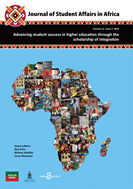Navigating the Power Outages: Impact and Coping Strategies of Students in a South African University during Loadshedding
DOI:
https://doi.org/10.24085/jsaa.v12i2.4643Keywords:
Loadshedding, Academic Performance, Students, Mental Health, Coping StrategiesAbstract
Loadshedding, the scheduled power outage implemented in South Africa, has significantly affected various sectors, including higher education institutions. This paper explores the impact of loadshedding on students in a South African university, focusing on the difficulties they face, and the coping strategies employed. The study adopts a mixed methods approach, combining quantitative data from a structured survey and qualitative insights from discussion interviews. The findings highlight the disruptions caused by loadshedding, including missed lectures, limited access to resources, and challenges in submitting assignments. Power outages also negatively affect students' mental health, leading to increased stress, anxiety, and feelings of isolation. The study emphasizes the need for support measures to address the mental health needs of students during loadshedding. Various coping strategies are identified, such as time management, alternative power sources, offline study materials, group study sessions, and self-care practices. Understanding and analysing these coping strategies are essential in mitigating the impact of loadshedding on students' academic progress and well-being. The study contributes to the understanding of loadshedding's multifaceted impact on students, providing insights for developing support measures and creating a conducive learning environment. These findings inform discussions among institutions, policymakers, and stakeholders to support students and address the challenges posed by loadshedding.
Downloads
Published
Issue
Section
License
Copyright (c) 2024 Nokukhanya Thembane

This work is licensed under a Creative Commons Attribution-NonCommercial-ShareAlike 4.0 International License.
Authors who publish with this journal agree to the following terms:
Authors retain copyright and grant the journal right of first publication with the work simultaneously licensed under the Creative Commons Attribution Share-alike 4.0 International License that allows others to share the work with an acknowledgement of the work's authorship and initial publication in this journal.
Authors are able to enter into separate, additional contractual arrangements for the non-exclusive distribution of the journal's published version of the work (e.g., post it to an institutional repository or publish it in a book), with an acknowledgement of its initial publication in this journal.
Authors are permitted and encouraged to post their work online (e.g., in institutional repositories or on their website) prior to and during the submission process, as it can lead to productive exchanges, as well as earlier and greater citation of published work (See: The Effect of Open Access).


